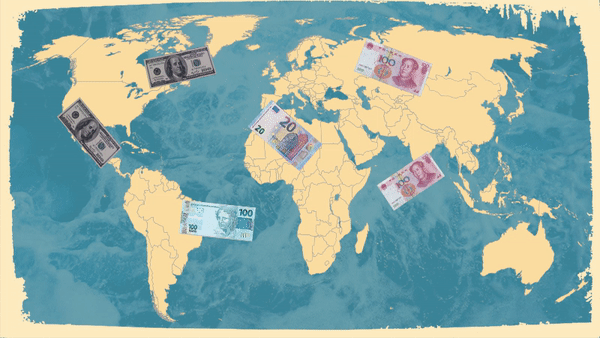September 30, 2022
What are remittances?
Some think of globalization mainly as cross-border flows of goods, services, ideas, and information. But crucial to globalization’s dynamism, and its powers of disruption, is the accelerating global movement of human beings. In fact, this is one of history’s oldest stories. People judge life “over there” to be safer and maybe more prosperous than life “over here,” and they hit the road in search of opportunities for richer lives and livelihoods.
And many of these people hope to help others. In every region of the world, migrants cross borders that separate poorer countries from wealthier ones in hopes of earning money they can share with those they’ve left behind, and the digital age has made it much easier for someone earning a relatively high wage abroad to send money back home in a matter of seconds. These financial flows are known as “remittances,” and they account for an increasingly large part of global economic activity. Small payments by large numbers of people add up: The World Bank estimated earlier this year that global remittances will reach $630 billion in 2022, a 4.2% annual jump.
The benefits of this process are widely shared. Remittances add wealth, opportunity, and therefore political stability to countries and families that need them. That’s especially important for poorer people in countries like India, Mexico, China, the Philippines, and Egypt, the world’s five largest remittance recipients in 2021. It’s even more important for countries like Lebanon, the Central Asian states, and small Pacific island nations, where remittance inflows make up from one-third to one-half of GDP.
They can provide a humanitarian lifeline for people trapped inside countries in trouble: Remittances once intended for Ukraine may now be flowing into the neighboring countries, particularly Poland, which is housing millions of Ukrainian refugees who need financial support. This boost for people in developing countries is never more important than in a time of rising global prices for food, fuel, and other basic necessities. Wealthy countries benefit too. Immigration increases the supply of labor by welcoming people who will, in some cases, take jobs that citizens of rich countries don’t want, putting downward pressure on production costs and retail prices.
But there are all kinds of disruptions that can break the virtuous circle of migration and remittances. Frictions arise when migrants create downward pressure on wages for some locals and social tensions when cultures clash. Fears of uncontrolled cross-border flows of people have created anxiety and anger in America and Europe. Wars and their fallout disrupt flows of money and people, a trend most obvious now in migrants from the Caucasus and Central Asia facing tougher economic conditions in Russia. The pandemic has also slowed migration in many regions, in some places dramatically. China’s “zero-COVID” policy, in particular, has made life much harder for those who would work in that country.
There is another potential source of remittance disruption: the cost of wiring money rises too. The global average cost of sending $200 reached 6% in the fourth quarter of 2021, according to the World Bank. That’s twice the level that the UN says will help poorer countries reach their development goals. It’s even more expensive to send money to Ukraine from some places and especially expensive to wire money to sub-Saharan Africa. Migration and the economic importance of remittances will surge in coming years as climate change, in particular, gives more people reason to move.More For You
TOKYO, JAPAN - FEBRUARY 8: Japan's Prime Minister Sanae Takaichi, leader of the ruling Liberal Democratic Party (LDP), places a red paper rose on the name of an elected candidate at the LDP headquarters on general election day on February 08, 2026 in Tokyo, Japan. Voters across the country headed to polls today as Japan's Lower House election was held.
Photo by Kim Kyung-Hoon - Pool/Getty Images
When Japanese Prime Minister Sanae Takaichi called snap elections last month, it was a big gamble. Holding a winter election just four months into her tenure with no real policy record to run on?
Most Popular
What's Good Wednesdays
What’s Good Wednesdays™, February 11, 2026
Sponsored posts
Football wins, local economy scores
Walmart sponsored posts
Walmart’s $1 billion investment is strengthening associate careers
Tune in on Saturday, February 14th at 12pm ET/6pm CET for the live premiere of our Global Stage from the 2026 Munich Security Conference, where our panel of experts takes aim at the latest global security challenges.
Microsoft unveiled a new set of commitments guiding its community‑first approach to AI infrastructure development. The strategy focuses on energy affordability, water efficiency, job creation, local investment, and AI‑driven skilling. As demand for digital infrastructure accelerates, the company is pushing a new model for responsible datacenter growth — one built on sustainability, economic mobility, and long‑term partnership with the communities that host it. The move signals how AI infrastructure is reshaping local economies and what people expect from the tech shaping their future. Read the full blog here.
Armed Israeli soldiers walk through an alley in the Old City of Hebron, in the occupied West Bank, on February 7, 2026. The Israeli army routinely secures routes and gathering points when settlers visit the city.
Photo by Mosab Shawer/Middle East Images/StringersHub/Sipa USA
The Israeli government unilaterally passed measures that allow Jewish settlers to purchase land in the West Bank, overriding past laws that effectively banned the sale of property there to anyone other than Palestinian residents.
© 2025 GZERO Media. All Rights Reserved | A Eurasia Group media company.
